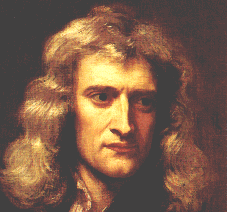Scientist and Mathematician
1642-1727
Isaac Newton was born on December 25, 1642 in WoolsThrope, near Grantham in Lincolnshire, England. He was born the same year Galileo dead. Newton clearly the most influential scientist who ever lived. His accomplishments in mathematics, optics, and physics laid the foundations for modern science and revolutionized the world. Newton was educated at Trinity College, Cambridge where he lived from 1661 to 1696. During this period he produced the bulk of his work on mathematics. In 1696 he was appointed master of the Royal Mint, and moved to London, where he resided until his death.
As mathematician, Newton invented integral calculus, and jointly with Leibnitz, differential calculus. He also calculated a formula for finding the velocity of sound in a gas which was later corrected by Laplace.
Newton made a huge impact on theoretical astronomy. He defined the laws of motion and universal gravitation which he used to predict precisely the motions of stars, and the planets around the sun. Using his discoveries in optics Newton constructed the first reflecting telescope.
Newton found science a hodgepodge of isolated facts and laws, capable of describing some phenomena, and predicting only a few. He left it with a unified system of laws that could be applied to an enormous range of physical phenomena, and used to make exact predications.
As a firm opponent of the attempt by King James II to make the universities in to catholic instructions, Newton was selected member of parliament for the University of Cambridge to the convention parliament of 1689, in 1690 he had moved to London as Warden of the Royal Mint. He became master of the Mint in 1699, an office he retained to his death. He was elected a fellow of the Royal Society of London in 1671, and in 1703 he became president, bring annually re-elected for the rest of his life. Newton published his works in two books, namely Optics and Principia.
As Newton science became increasingly accepted on the continent, and especially after a general peace was restored in 1714, following the war of the Spanish succession, Newton became the most highly esteemed natural philosopher in Europe. His last decades were passed in revising his major works, polishing his studies of ancient history, and defending himself against critics, as well as carrying out his official duties. Newton was modest, diffident, and a man of simple tastes. He was angered by criticism or opposition, and harbored resentment; he was harsh towards enemies but generous to friends. In government and at Royal Society, he proved an able administrator. He never married and lived modestly, but was buried with great pump. Newton dead in London on March 20, 1727 and was buried in Westminster Abbey, the first scientists to be accorded this honor. A review of an encyclopedia of science will reveal at least two or three times more references to Newton than any other individual scientists.
Newton has been regarded for almost 300 years as the founding exemplar of modern physical science, his achievements in experimental investigation being as innovative as those in mathematical research. With equal, if not greater, energy and originality he also plunged into chemistry, the early history of western civilization and theology; among his special studies was an investigation of the form and dimensions.









































1 comments:
he was a talented and genius person :)
nice post
own occupation disability insurance
Post a Comment